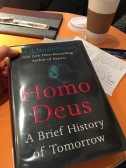 Homo Deus: A Brief History of Tomorrow
Homo Deus: A Brief History of TomorrowYuval Noah Harari
It was the title, Homo Deus, that lured me to start this book, but I think it is the subtitle, a brief history of tomorrow, that actually embodies the thesis of the book batter than Homo Deus, an “upgraded” human being with god-like capacities. History is about the past, so how could we even talk about a history of tomorrow? This contradictory subtitle makes sense once you learn the reason for studying history provided by the author. He wrote,
“If history doesn’t follow any stable rules, and if we cannot predict its future course, why study it? … historians are asked to examine the actions of our ancestors so that we can repeat their wise decisions and avoid their mistakes. But it almost never works like that because the present is just too different from the past… Though historians occasionally try their hand at prophecy (without notable success), the study of history aims above all to make us aware of possibilities we don’t normally consider. Historians study the past not in order to repeat it, but in order to be liberated from it…Studying history aims to loosen the grip of the past. It enables us to turn our head this way and that, and begin to notice possibilities that our ancestors could not imagine, or didn’t want us to imagine. By observing the accidental chain of events that led us here, we realize how our very thoughts and dreams took shape—will not tell us what to choose, but at least it gives us more options” (60).
This interesting viewpoint to look at the future makes the book unique. First of all, the author illustrates the future not as an isolated entity, but as part of human history—there is no boundary showing where the present ends and the future starts. Thus, unlike many writings about the future, the book spends considerable time describing the current transition where humanism dwindles and dataism soars. Second, the author throws out fundamental questions whose answers could change the course of our history.
“These three processes raise three key questions, which I hope will stick in your mind long after you have finished this book: Are organisms really just algorithms, and is life really just data processing? What’s more valuable — intelligence or consciousness? What will happen to society, politics and daily life when non-conscious but highly intelligent algorithms know us better than we know ourselves?” (402).
Is it a wishful thinking that human beings cannot be reduced to algorithms and that moral values can be upheld in the midst of the efficiency craze? Mulling over this question, I realized the author’s implicit message in the book—take part in making the history of tomorrow.
After all, what seems like “the accidental chain of events” is in fact a product of contemplation and deliberate decisions.
